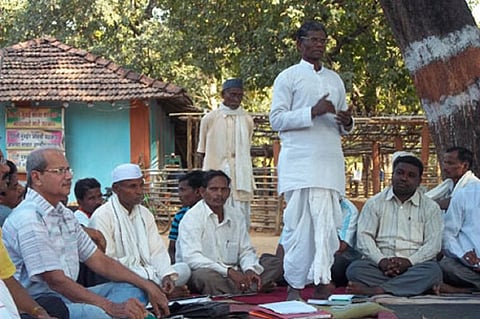

The Maharashtra government recently notified Mendha, a village deep inside the forests of the state’s Gadchiroli district, as a separate Gram Panchayat under The Maharashtra Gramdan Act, 1964.
The development means the struggle of Mendha’s residents for self-rule and sovereignty over their forests and land seems to be finally coming to an end.
Mendha’s battle to implement Gramdan began over a decade ago in 2013. Gramdan is a historic Act born of Vinoba Bhave’s landmark 1950s Bhoodan Gramdan Movement, which has now been long forgotten in most of the areas it took place in.
Mendha got Gramdan status in October 2023. That is when the Nagpur bench of the Bombay High Court directed the Maharashtra government to issue a notification declaring the village as a ‘Gramdan village’ under the Act.
Following this, the next step was to notify it as an independent Panchayat and separate it from the Lekha Panchayat, of which it was a part. It finally issued this notification on February 21 this year.
The Act gives wide powers and responsibilities to the gram-mandal (Gram Sabha) for the administration, development and welfare of the village.
Gramdan is an expansion of the Bhoodan Movement started in 1951 by Gandhian Bhave. ‘Bhoodan’ meant redistribution of land from bigger landowners to the landless. Under Gramdan, the entire village will put its land under a common trust.
This way, the land will not be sold outside the village or to one who has not joined Gramdan in the village. But the landowners can continue to cultivate it and reap the benefits.
The Movement paved the way for the protection of natural resources by giving equal rights and responsibilities to everyone in the community and empowering communities to move towards self-governance.
Under the Act, at least 75 per cent of landowners in the village should surrender land ownership to the village community for it to be declared as ‘gramdan’. Such land should at least be 60 per cent of the village land. Five per cent of the surrendered land is distributed to the landless in the village for cultivation. Recipients of such land cannot transfer the same without the permission of the community. The rest remains with the donors. They and their descendants can work on it and reap the benefits. But they cannot sell it outside the village or to a village resident who has not joined Gramdan.
Today, seven states in India have 3,660 Gramdan villages, the highest being in Odisha (1,309). The states are Andhra Pradesh, Bihar, Maharashtra, Odisha, Rajasthan, Tamil Nadu and Uttar Pradesh.
In September 2022, the Assam government repealed the Assam Gramdan Act, 1961 and Assam Bhoodan Act, 1965, bypassing The Assam Land and Revenue Regulation (Amendment) Bill, 2022. This, it said, was done to counter encroachment on donated lands in the state. Till that time, Assam had 312 Gramdan villages.
In 2023, Down To Earth had travelled to 10 Gramdan villages in Maharashtra and Rajasthan to study the relevance of the Act and found several problems. Many villages wanted to exit from the Act, except Mendha which had been fighting for implementing its ‘Gramdan’ status. In a society that is moving towards hyper-individualism, the community here takes a collective approach.
The village, comprising around 500 Gond Adivasis, has fought for its forests for years. It is popular as the first village in India to secure community forest rights (CFR), following the passing of the Scheduled Tribes and Other Traditional Forest Dwellers (Recognition of Forest Rights) Act, 2006. Some 80 per cent of the area in the village is covered with dense forest.
People here believe that land is not a private property but a collective resource that provides food and livelihood and should be saved and passed on to the next generation.
All villagers in Mendha have surrendered their land, which is unique. In all other villages, only about 75-80 per cent of landowners had agreed to do so. The village fulfilled these conditions of the Act in 2013 and notified the district collector about its decision to implement the Act. The next step included declaring it as an independent Panchayat. This was to be done by the state government’s revenue and Panchayat departments. But it did not happen, following which Mendha moved the Nagpur bench of the Bombay High Court.
“Now the Zila Parishad will have to make changes in the village’s land records and give Mendha all the rights and benefits of a Gram Panchayat. After this, the village will exist independently,” said Parag Cholkar, a Gandhian scholar, who has researched and written books on Gramdan, and has been involved with the village’s fight in the court.